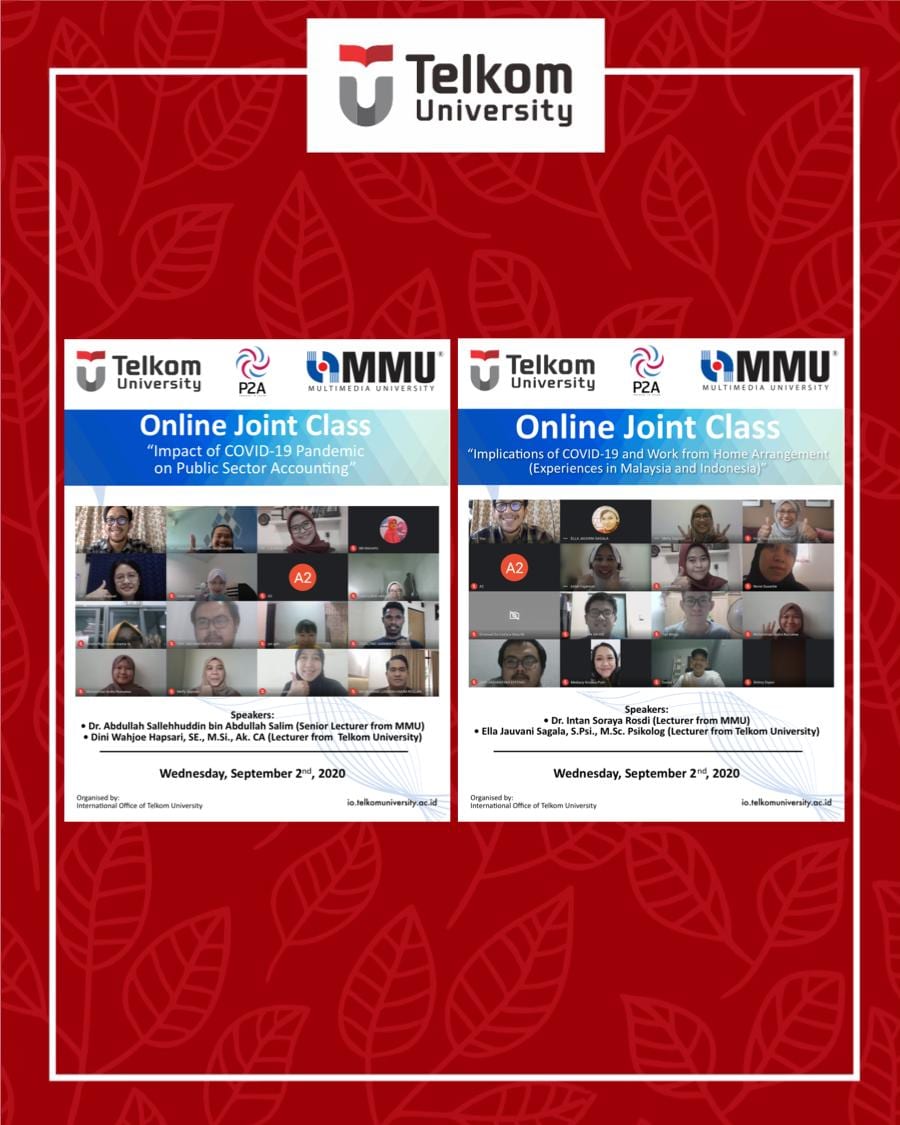
COVID-19 Impact & Its Implication , the 8th & 9th Online Joint Class Tel U & MMU
COVID-19 Impact & Its Implication , the 8th & 9th Online Joint Class Tel U & MMU. On September 2nd, 2020, Telkom University held an Online Joint Class which was divided into morning sessions and afternoon sessions. In the morning session, Dr. Abdullah Sallehhuddin bin Abdullah Salim, a senior lecturer of Multimedia University Malaysia and Dini Yahjoe Hapsari, SE., M.Si., Ak. CA, a lecturer of Telkom University had the opportunity to share about “Impact of COVID-19 Pandemic on Public Sector Accounting”, while in the afternoon session, Dr. Intan Soraya Rosdi, a lecture of MMU and Ella Jauvani Sagala, S.Psi, M.Sc. Psikolog, a lecture of Telkom University shared about “Implications of Covid-19 & the Work From Home Arrangement: Experiences in Malaysia and Indonesia”.
As we all know and experience together, Covid-19 has changed our habits a lot as well as affects all lines of life. Covid-19 severely are upsetting health, freedom of movement, food security, employment, education, trade, and leisure. During this pandemic, we have been experiencing in having limited access to almost all places, staying at home for certain period of times, having physical distancing, and having healthy life matter. Of course this has many impacts to all lines including economic aspect such as a decline in economic growth, unstable national economic, a decline in social status, and digital platform transformation.
This pandemic is no joking. Imagine, it has been sudden and severe forcing many business to close down; one quarter of labour force has been disrupted; government in almost countries are taking through the channel of intergovernmental fiscal relations to tackle this crisis; the world remains confronted with a global pandemic outbreak that is challenging policymaker at all level of government; one quarter of GDP directly impacted by the present of crisis. So, what should we do? What should government do?
In term of public sector accounting, to overcome the situation due to the Covid-19 impact, government in both Indonesia and Malaysia regulate several policies such as:
- Promoting local product with the campaign “from us, by us, and for us”
- Managing the fulfillment of domestic consumption
- Increasing local production especially basic needs production
- Encouraging appropriate innovation by increasing production capacity in each region
- Government intervention by providing economic incentives, decreasing income tax
- Implementing economic development
Besides, there are several strategies in dealing with the Covid-19 situation that Indonesian and Malaysian government propose, such as:
- Providing cash transfer and non-cash to people impacted and infected of Covid-19
- Implementing intensive program for SMEs, household, unemployment
- Allocating more fund for education especially for school from home program
- Allocating more fund for healthcare sector especially when the vaccine is not ready
- Re-imagining the way of working and figuring out on how to use the spending to push business and employees on to digital platform
While waiting for the end of the pandemic, which is still uncertain, the government, ready or not, with pros and cons, has the courage to adapt to the situation created by this pandemic by promoting the new normal campaign, or in Indonesia it is called by Adaptasi Kebiasaan Baru. The government has begun to reopen places of worship and several public spaces. Various business sectors were again allowed to operate.
But of course, by implementing strict health protocols, visitors are required to wear masks, keep their distance (physical distancing), maintain hygiene by always washing hands, and wear personal equipment. Several institution and business have implemented a flexible working arrangement (Working From Home). Absolutely, everything has benefit and challenge, including the WFH. The good thing from WFH is of course we have flexible time; we can avoid long commutes; it is cost-saving; and it is environment-friendly.
However, WFH also brings difficulties because we experience physical distancing/lack of sociability, communication challenges, screen fatigue, reduced motivation, and the worst one is creating imbalance of working life and personal life. That issue raise a dilemma: “work-life balance” or “work-life integration”. Work-life balance is about a mindset when work fits seamlessly into personal values and passion, while work-life integration is about tech-enabled when technology enables individuals to work anytime, anyplace. So, what about you, guys? Work-life balance or work-life integration? The important thing is whatever it takes let’s live life to the fullest. Stay healthy and happy wherever you work.(IO)***
